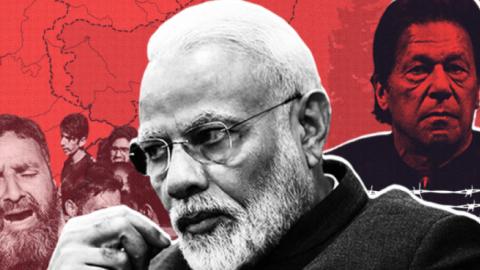Politicians in India and Pakistan periodically demonstrate the commonality of their heritage by engaging in grandiloquence and bombast that they do not seriously mean. But even in the subcontinent, words have consequences. Statements by Indian ministers about reclaiming parts of the erstwhile princely state of Jammu and Kashmir, currently controlled by China and Pakistan, run the risk of portraying India as a revisionist power.
Since Independence, Indian foreign policy has rested on the premise that India accepts the territorial status quo in its neighbourhood. India expects recognition as the region’s pre-eminent power on account of being the largest country in South Asia and one of the two largest in Asia in terms of population. The size of its economy and armed forces, as well as its ability to project power, reinforce that pre-eminence.
For those unfamiliar with the terms, international relations experts distinguish the foreign policy of states as either status quo or revisionist based on their leaders’ words and actions. Prominent scholar, Robert Gilpin, defined status quo powers as those who accept specific rules “of interstate diplomacy, of security institutions, and of international economic institutions;” who do not challenge through speech or actions “the distribution of power globally or regionally;” and are less interested in altering the international “hierarchy of prestige”.
Revisionist powers seek to alter all these components of international order while status quo powers do not like going beyond seeking minor adjustments. Historically, Indian diplomats have asserted India’s preference for global order while seeking at the same time an enhanced stature for India on the global stage.
A change in stance?
Recently, Defence Minister Rajnath Singh opened the prospect of India revising its doctrine of No First Use (NFU) of nuclear weapons, given the threat of battlefield nukes being deployed by Pakistan. Then, Home Minister Amit Shah asserted India’s “right to form laws” for Jammu and Kashmir, including Pakistan-controlled territory and Aksai Chin. Rajnath Singh upped the ante by noting that Pakistan “is in illegal occupation of Pakistan-occupied Kashmir, including Gilgit Baltistan” and any future talks between India and Pakistan would have to be about those territories.
More recently, External Affairs Minister Subrahmanyam Jaishankar insisted that the Pakistan-controlled part of Kashmir “is part of India and we expect one day that we will have the physical jurisdiction over it”. This marked a change in the decades-old Indian willingness to negotiate an end to Pakistan’s claims over Kashmir by accepting the Line of Control as a finally agreed international border.
The willingness to forego claims to Pakistan-controlled territory dates back to 1963, when the United States and the United Kingdom initiated India-Pakistan dialogue at the ministerial level. India’s then-Railways Minister Swaran Singh tried to negotiate an end to the dispute with Pakistan’s Minister for Natural Resources Zulfikar Ali Bhutto by offering territorial adjustments along the 1948 ceasefire line and dividing the disputed state. Pakistan turned down the offer and chose to fight for Kashmir instead, leading to the 1965 war.
In 1972, during the Simla talks following Pakistan’s loss of Bangladesh, the ceasefire line was transformed into the Line of Control (LoC) on the assumption that it would become the India-Pakistan border over time. The back-channel talks between Pakistani dictator General Pervez Musharraf and then-Indian Prime Minister Manmohan Singh were also based on a similar premise.
Thousands of women are using this online fertility calculator to accurately plan for a baby and find out the best dates of the month for doing so.
A calculated strategy?
The recent statements by Indian ministers could be part of a calculated strategy to remind Pakistan that India could reverse Pakistani rhetoric on use of nuclear weapons and the argument that the dispute over Jammu and Kashmir is the unfinished business of Partition. But the rhetoric on taking Pakistan-controlled Kashmir could prove dangerous if India acts on it.
Undoubtedly, Pakistan would consider any attack on territory controlled by it as an act of war. That is why it is more likely that the Indian politicians making tough statements are just trying to create a new issue to counter Pakistan’s narrative over the human rights situation in Jammu and Kashmir. The Indian point seems to be that Pakistan should stop focusing on Indian Kashmir or risk having to deal with New Delhi’s claims that the entire erstwhile princely state of Jammu and Kashmir belongs to India.
But it could also mark a shift in India’s stance, away from its traditional willingness to accept the status quo. If that is the case, India’s leaders need to consider the implications of being a revisionist power. For one, revisionist powers are viewed with concern and have fewer friends than India has become accustomed to having.
It would be detrimental to India’s global standing if, in an effort to match Pakistan’s rhetoric, its leaders reverse the country’s global standing as an important pillar of world order. Indian diplomats have, for years, worked hard to de-hyphenate their country from Pakistan. If the current trend towards Indian revisionism reinstates the hyphen, and everyone around the world starts talking again of India-Pakistan, Islamabad would win the battle without even trying.



















